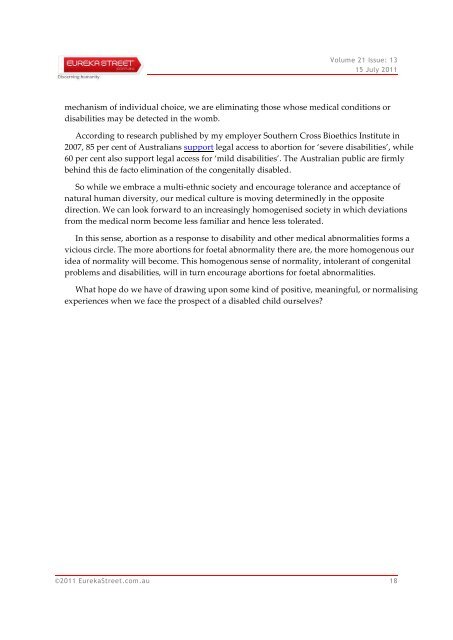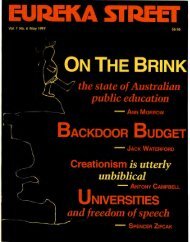15 July 2011 Volume: 21 Issue: 13 North Korea's ... - Eureka Street
15 July 2011 Volume: 21 Issue: 13 North Korea's ... - Eureka Street
15 July 2011 Volume: 21 Issue: 13 North Korea's ... - Eureka Street
Create successful ePaper yourself
Turn your PDF publications into a flip-book with our unique Google optimized e-Paper software.
<strong>Volume</strong> <strong>21</strong> <strong>Issue</strong>: <strong>13</strong><strong>15</strong> <strong>July</strong> <strong>2011</strong>mechanism of individual choice, we are eliminating those whose medical conditions ordisabilities may be detected in the womb.According to research published by my employer Southern Cross Bioethics Institute in2007, 85 per cent of Australians support legal access to abortion for ‘severe disabilities’, while60 per cent also support legal access for ‘mild disabilities’. The Australian public are firmlybehind this de facto elimination of the congenitally disabled.So while we embrace a multi-ethnic society and encourage tolerance and acceptance ofnatural human diversity, our medical culture is moving determinedly in the oppositedirection. We can look forward to an increasingly homogenised society in which deviationsfrom the medical norm become less familiar and hence less tolerated.In this sense, abortion as a response to disability and other medical abnormalities forms avicious circle. The more abortions for foetal abnormality there are, the more homogenous ouridea of normality will become. This homogenous sense of normality, intolerant of congenitalproblems and disabilities, will in turn encourage abortions for foetal abnormalities.What hope do we have of drawing upon some kind of positive, meaningful, or normalisingexperiences when we face the prospect of a disabled child ourselves?©<strong>2011</strong> <strong>Eureka</strong><strong>Street</strong>.com.au 18
















